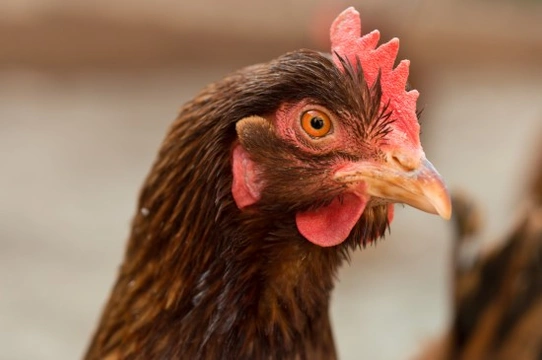
Blindness in Chickens
When it comes to eye problems in chickens, just as with any other living things, they tend to suffer from some illnesses and diseases which can affect their sight to varying degrees. However, cockerels often fight and will cause some serious injuries to each other not only on their bodies but their eyes too. The eyes are delicate and if any injury does occur, treating them has to be done with very great care.
Blindness in chickens is not a very common issue unless a fight between cockerels has caused such a serious injury to an eye that it leads to blindness. However, there are other health issues that affect a chicken's eyes which, if left untreated may well cause permanent blindness and this includes conditions like conjunctivitis. Other reasons why a bird might go blind include the following:
- Many crested breeds like the Poland commonly have feathers growing in their eyes which can cause a serious problem with their sight
- A few types of Marek's disease may render an eye grey and birds may well become completely blind or partially sighted in the affected eye
- A badly ventilated chicken house where the levels of ammonia rise too high can cause damage to the cornea which can be permanently damaged even if conditions in their environment are improved. Fortunately, it's easy to smell ammonia and if the odour is too strong when you open up a coop first thing in the morning, then you would need to improve the ventilation by creating more weatherproofed holes and vents
- Scratches as well as physical trauma to an eye can result in blindness
- Respiratory infections particularly in the upper respiratory tract often lead to eye problems with puss forming around the eyes which sticks them together causing blindness albeit temporarily
There are some very good antibiotic eye drops that a vet would be able to prescribe once they have examined a chicken and which are particularly effective in combating eye infections in chickens.
Signs a Chicken's Sight is Impaired
Very often owners notice that a chicken has problems pecking at their food, and more often than not they miss the mark which in turn means they lose condition and weight. Although, this could be due to the bird having received a trauma to an eye, the more common cause is because they are fed a diet that's deficient in Vitamin A. However, if a chicken is being fed a good quality poultry feed, then it should contain the right levels of Vitamin A.
If it's not due to diet there could well be an underlying health issue that's causing the problem and which makes it that much harder for birds to absorb food due to their digestive systems being compromised. Very often this could be due to an internal worm problem or a condition knows as Coccidiosis. You can add a little cod liver oil (2%) to your chicken's diet by mixing it in with their mixed corn or other feed but you have to be careful because too much Vitamin A can be toxic to chickens. A good supplement to add include in a diet is Beryl's Friendly Bacteria.
Injuries Caused by Fighting
If you keep two or more cockerels, then you should expect them to start fighting and this is especially true as the birds reach maturity. Most cockerels develop very sharp spurs which can cause very serious injuries. Another problem is when mating, a cockerel's spurs often injure hens and these wounds are often missed because they are under her wings. This is why it's important to check your hens on a regular basis to see if she has suffered any injuries and to treat them with a poultry safe antibiotic ointment.
If you find your hens are being injured and that cockerels are fighting with each other, the best thing to do is trim back their spurs by taking off the very sharp tips and then rounding these off. You should only trim spurs a little because about ¾ of the way along there are blood vessels. You need to use a pair of good quality clippers – the best ones being the sort you use on large dogs. Once trimmed, the spurs can then be rounded off using a file.
If you do hit the blood vessel, you can either use a drop of super-glue on the spur or if you have a Veterinary Silver Nitrate pencil which you can get from your vet, this too can be dabbed on the end of the spur to prevent any blood loss.
How Chickens Cope with Blindness
Chickens cope quite well if they lose the sight in one eye and some people even have cockerels that have lost the sight in both eyes but that do very well as long as they are kept in safe enclosures. The real problems is that if a chicken's sight is seriously compromised, they are at greater risk of being caught by predators. However, if kept in a safe and secure pen, partially sighted chickens can manage very well.
Conclusion
As with all living things, a chicken's eyes are delicate and as such if they are injured or damaged in any way, treating the eye has to be done very carefully and as quickly as possible. You should never use any medication on a chicken's eyes which has not be specifically prescribed by your vet because you may well do more harm than good if you do so and you would need to use the drops or other medication as recommended by the manufacturer and your vet.



